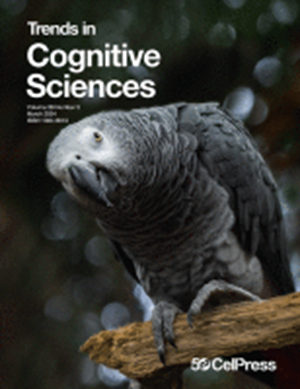在睡眠中忘记不想要的记忆
IF 16.7
1区 心理学
Q1 BEHAVIORAL SCIENCES
Trends in Cognitive Sciences
Pub Date : 2024-10-01
Epub Date: 2024-08-20
DOI:10.1016/j.tics.2024.07.011
引用次数: 0
摘要
记忆有时是最好的遗忘,但我们的大脑是如何弱化过去不想要的细节的呢?我们提出了一个理论框架,在这个框架中,睡眠期间的记忆再激活支持适应性遗忘。这种记忆性再平衡确保我们的记忆与情感目标保持一致,从而为睡眠的情感益处奠定了基础。本文章由计算机程序翻译,如有差异,请以英文原文为准。
Forgetting unwanted memories in sleep.
Memories are sometimes best forgotten, but how do our brains weaken unwanted details of the past? We propose a theoretical framework in which memory reactivation during sleep supports adaptive forgetting. This mnemonic rebalancing underpins the affective benefits of sleep by ensuring that our memories remain aligned with our emotional goals.
求助全文
通过发布文献求助,成功后即可免费获取论文全文。
去求助
来源期刊

Trends in Cognitive Sciences
医学-行为科学
CiteScore
27.90
自引率
1.50%
发文量
156
审稿时长
6-12 weeks
期刊介绍:
Essential reading for those working directly in the cognitive sciences or in related specialist areas, Trends in Cognitive Sciences provides an instant overview of current thinking for scientists, students and teachers who want to keep up with the latest developments in the cognitive sciences. The journal brings together research in psychology, artificial intelligence, linguistics, philosophy, computer science and neuroscience. Trends in Cognitive Sciences provides a platform for the interaction of these disciplines and the evolution of cognitive science as an independent field of study.
 求助内容:
求助内容: 应助结果提醒方式:
应助结果提醒方式:


